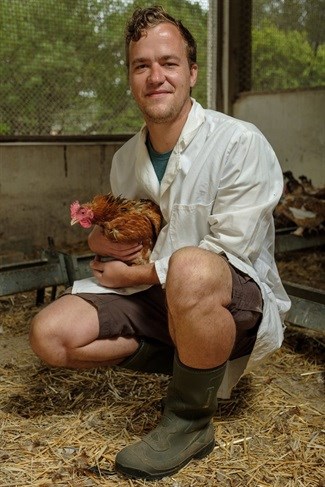
Top stories

Marketing & MediaBehind the campaign: Reframing fairness in ride-hailing: The inDrive success story
inDrive 2 hours





More news
















Deon Neveling says one needs a strong stomach for this type of research, and a thick skin to withstand the complaints about the smell emanating from your lab bench. "My colleagues squealed so much I had to move my research into a small room in the furthest corner of the JC Smuts building."
According to his supervisor, Professor Leon Dicks, this is the first time that a probiotic for broiler chickens is based on the gut microbiome of free-range, healthy chickens. "In other words, a probiotic for chickens, from chickens."
Neveling explains that he collected the discarded guts of free-range chickens that came up for slaughter at the University’s Mariendahl experimental farm. He then mashed it into a liquid and plated it onto several hundred petri dishes.
As soon as the bacteria started growing, Neveling would obtain them in pure culture and identify the species– a very labour intensive process indeed. After eight months he succeeded in identifying six beneficial bacterial species – each from a specific section of the gut.
To ensure its probiotic character, the bacteria were then subjected to a range of tests. The next step was to test its safety as a feed additive, and then its ability to decrease the incidence of Salmonella in broiler chickens.

As part of his research, Deon participated in an Erasmus Mundus INSPIRE Scholarship program and spent nine months at Ghent University in Belgium to study the interaction of beneficial and pathogenic bacteria with epithelial cells. He also completed short courses in entrepreneurship with Innovus and TIA (Technology Innovation Agency), and participated in the SWISS-SA business development programme.
"Worldwide, there is a trend to use probiotics rather than antibiotics to improve the health and survival of broiler chickens," explains Neveling.
"In the European Union, for example, the use of antibiotics as growth promoter in animal feed has been banned in an attempt to control natural selection for antibiotic-resistant pathogens and to ensure that currently available antibiotics remain effective in the treatment of animal and human infections."
However, the addition of probiotics to broiler feed is still far from being implemented on a regular basis, mainly due to a lack of in-depth knowledge about the complex dynamics of the poultry gut, and the multitude of parameters that influence the efficacy of probiotics.
Neveling says the next step will be to find someone who will be willing to invest in the large-scale testing of his newly-developed probiotic. And then he hopes to establish a South African-based probiotic manufacturing company.